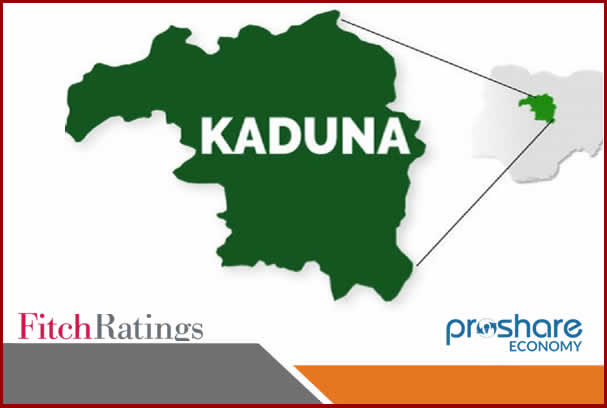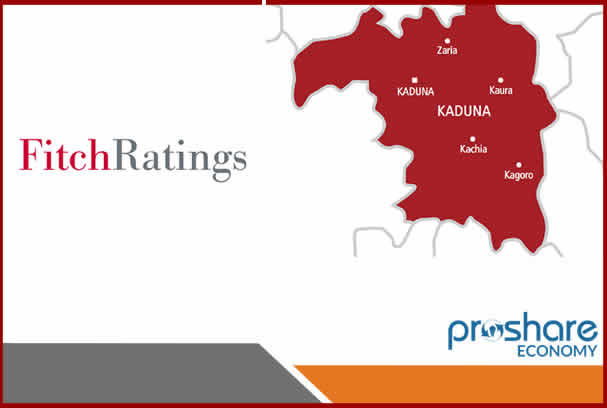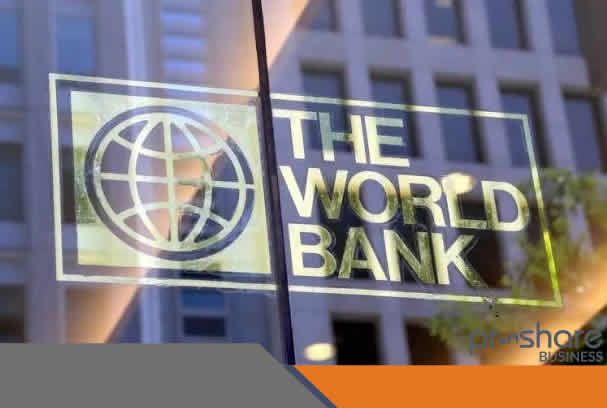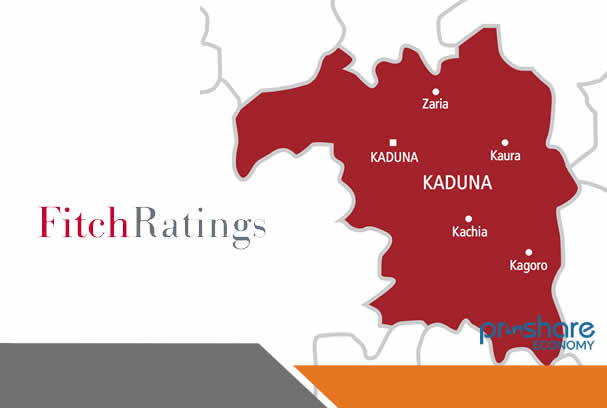Fitch Ratings has downgraded Kaduna State's Long-Term Foreign- and Local-Currency Issuer Default Ratings (IDRs) to 'B-' from 'B' following the downgrade of the sovereign (see Fitch Downgrades Nigeria to 'B-'; Outlook Stable). The Outlooks are Stable.
Under applicable credit rating agency (CRA) regulations, the publication of local and regional government reviews is subject to restrictions and must take place according to a published schedule, except where it is necessary for CRAs to deviate from this schedule in order to comply with the CRAs' obligation to issue credit ratings based on all available and relevant information and disclose credit ratings in a timely manner. Fitch interprets these provisions as allowing us to publish a rating review in situations where there is a material change in the creditworthiness of the issuer that we believe makes it inappropriate for us to wait until the next scheduled review date to update the rating or Outlook/Watch status. The next scheduled review date for Fitch's rating on Kaduna State is in 2023, but Fitch believes that developments for the issuer warrant such a deviation from the calendar and our rationale for this is set out in the first part (High weight factors) of the Key Rating Drivers section below
Following the downgrade of Nigeria's IDRs, we have downgraded Kaduna to reflect the sovereign cap. Its Outlooks move in tandem with the sovereign's.
The ratings also reflect the state's vulnerable risk profile by international standards against Fitch's expectations of growing debt to fund necessary capex for the development of basic infrastructure and social services, which drive the state's Standalone Credit Profile (SCP) of 'b'.
Key Rating Drivers
High
Sovereign Cap
As per Fitch's rating criteria, Kaduna's IDRs are capped by the sovereign's and its Outlooks reflect those on the sovereign. Fitch considers that the national government's role remains predominant in Nigerian intergovernmental relations, as it controls the equalisation mechanism enacted through a system of transfers to states. Therefore, rating action on the sovereign will be mirrored on Kaduna, provided that its budgetary performance and debt metrics remain in line with Fitch's expectations.
Low
Risk Profile: Vulnerable
Kaduna's 'Vulnerable' risk profile reflects Fitch's view of a very high risk relative to international peers that Kaduna's ability to cover debt service with its operating balance may weaken unexpectedly over the forecast horizon (2022-2026). This may be due to lower-than-expected revenue, higher-than-expected expenditure, or an unexpected rise in liabilities or debt or debt-service requirements.
Kaduna's revenue structure is influenced by the state's weak socioeconomic profile and reliance on volatile transfers from the federal government. Kaduna has broad responsibilities and high spending needs, and capex plays a key role in developing the local economy and growing internally generated revenue (IGR).
Debt Sustainability - 'bb' category
In its rating scenario of a prolonged economic downturn, Fitch expects Kaduna's debt-to-operating balance (payback) ratio to increase to above 20x (2020: 5.4x), incorporating the effects of an economic downturn. Fitch expects some volatility in the payback ratios in 2021-2022 due to volatile oil-related transfers from the federal government of Nigeria and operating spending increasing after it declined sharply in 2020 during the Covid-19 pandemic.
Secondary metrics - fiscal debt burden measured by net adjusted debt/operating revenue - could rise above 300%, but the operating balance would cover Kaduna's actual debt service by 1x.
Derivation Summary
Kaduna's 'b' SCP reflects a combination of a 'Vulnerable' risk profile and a 'bb' debt sustainability. The SCP also factors in Kaduna's high debt burden compared with international peers and debt-service support from the central government through deductions from statutory allocation factored into the debt framework. Fitch does not apply any asymmetric risk or ad-hoc support from the central government and views inter-governmental financing as neutral to Kaduna's ratings.
Kaduna's ratings are now capped at the sovereign level of 'B-' as the federal government retains predominant influence over Nigerian inter-governmental relations and resource allocation to states.
Key Assumptions
Qualitative assumptions:
Risk Profile: 'Vulnerable, Unchanged with Low weight'
Revenue Robustness: 'Weaker, Unchanged with Low weight'
Revenue Adjustability: 'Weaker, Unchanged with Low weight'
Expenditure Sustainability: 'Weaker, Unchanged with Low weight'
Expenditure Adjustability: 'Midrange, Unchanged with Low weight'
Liabilities and Liquidity Robustness: 'Weaker, Unchanged with Low weight'
Liabilities and Liquidity Flexibility: 'Weaker, Unchanged with Low weight'
Debt sustainability: 'bb, Unchanged with Low weight'
Support (Budget Loans): 'N/A, Unchanged with Low weight'
Support (Ad Hoc): 'N/A, Unchanged with Low weight'
Asymmetric Risk: 'N/A, Unchanged with Low weight'
Sovereign Cap: 'B-, Lowered with High Weight'
Sovereign Floor: 'N/A, Unchanged with Low weight'
Quantitative assumptions - Issuer Specific
Fitch's rating case is a "through-the-cycle" scenario, which incorporates a combination of revenue, cost and financial risk stresses. It is based on 2017-2021 (preliminary) figures and 2022-2026 projected ratios. The key assumptions for the scenario include:
- Operating revenue growth on average at 2.6%, with 10% increase in tax revenue but 9% decrease in transfers; low weight
- Operating expenditure growth at 11%, below inflation; low weight
- Net capex on average at NGN67 billion; low weight
- Apparent cost of debt at 1.7%; low weight
Quantitative assumptions - Sovereign Related
Figures as per Fitch's sovereign actual for 2021 and forecast for 2023, respectively (no weights and changes since the last review are included as none of these assumptions was material to the rating action):
-GDP per capita (US dollar, market exchange rate): 2,033.49; 2,373.44
-Real GDP growth (%): 3.65; 3.12
-Consumer prices (annual average % change): 16.98; 17.75
-General government balance (% of GDP): -5.93; -5.21
-General government debt (% of GDP): 32.60; 35.41
-Current account balance plus net FDI (% of GDP): -0.08; 0.15
- Net external debt (% of GDP): 5.17; 6.14
-IMF Development Classification: Emerging Markets
-CDS Market-Implied Rating: N/A
Rating Sensitivities
Factors that could, individually or collectively, lead to positive rating action/upgrade:
- Positive rating action on the sovereign could lead to similar action on Kaduna, provided Kaduna's debt metrics remain in line with Fitch's expectations
Factors that could, individually or collectively, lead to negative rating action/downgrade:
- Negative rating action on the sovereign could lead to corresponding rating action on Kaduna
- Weakening debt sustainability due to social unrest damaging economic prospects or undermining transfers from the central government could also trigger a downgrade
Best/Worst Case Rating Scenario
International scale credit ratings of Sovereigns, Public Finance and Infrastructure issuers have a best-case rating upgrade scenario (defined as the 99th percentile of rating transitions, measured in a positive direction) of three notches over a three-year rating horizon; and a worst-case rating downgrade scenario (defined as the 99th percentile of rating transitions, measured in a negative direction) of three notches over three years. The complete span of best- and worst-case scenario credit ratings for all rating categories ranges from 'AAA' to 'D'. Best- and worst-case scenario credit ratings are based on historical performance.
Issuer Profile
Kaduna's fast-growing population of over 8 million and a traditionally strong primary sector contribute to weak socio-economic standards. The public sector is a key employer in the state, directly and through its planned investment programmes. A large informal economy hinders private-sector development, which ultimately affects the IGR tax base.
References for Substantially Material Source Cited as Key Driver Of Rating
The principal sources of information used in the analysis are described in the Applicable Criteria.
Public Ratings With Credit Linkage to Other Ratings
Kaduna's ratings are capped by Nigeria's (B-/Stable).
COMMITTEE MINUTE SUMMARY
Committee date: 25 November 2022
There was an appropriate quorum at the committee and the members confirmed that they were free from recusal. It was agreed that the data was sufficiently robust relative to its materiality. During the committee no material issues were raised that were not in the original committee package. The main rating factors under the relevant criteria were discussed by the committee members. The rating decision as discussed in this rating action commentary reflects the committee discussion.
ESG Considerations
Kaduna has an ESG Relevance Score of '4' for biodiversity and natural resource management, due to the state's dependency on oil-related transfers from the sovereign that affect financial operations, which has a negative impact on the credit profile, and is relevant to the ratings in conjunction with other factors.
Kaduna has an ESG Relevance Score of '4' for energy management due to low energy efficiency and grid reliance that constrain the state's economic development, which has a negative impact on the credit profile, and is relevant to the ratings in conjunction with other factors.
Kaduna has an ESG Relevance Score of '4' for human rights and political freedoms due to the presence of ethnic conflicts in the region that affects core human rights and the treatment of minorities, which has a negative impact on the credit profile, and is relevant to the ratings in conjunction with other factors.
Kaduna has an ESG Relevance Score of '4' for human development, health and education due to its lower Human Development Index than the average in Nigeria, which has a negative impact on the credit profile, and is relevant to the ratings in conjunction with other factors.
Kaduna has an ESG Relevance Score of '4' for population and demographics, due to its below-average socio-economic indicators and the majority of the population living below the poverty line, which has a negative impact on the credit profile, and is relevant to the ratings in conjunction with other factors.
Kaduna has an ESG Relevance Score of '4' for political stability and rights due to political divisions leading to unpredictable policy shifts with low budget predictability, which has a negative impact on the credit profile, and is relevant to the ratings in conjunction with other factors.
Unless otherwise disclosed in this section, the highest level of ESG credit relevance is a score of '3'. This means ESG issues are credit-neutral or have only a minimal credit impact on the entity, either due to their nature or the way in which they are being managed by the entity.
 Lagos, NG • GMT +1
Lagos, NG • GMT +1











 186 views
186 views












 Sponsored Ad
Sponsored Ad
 Advertise with Us
Advertise with Us







